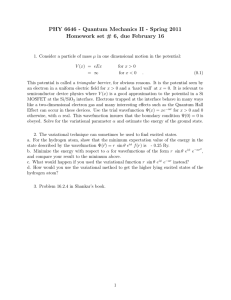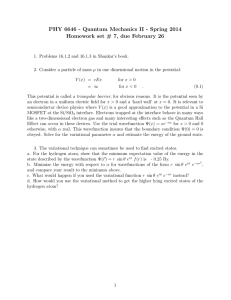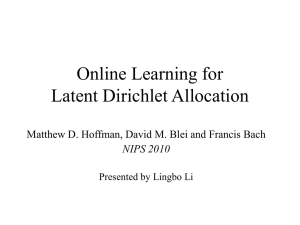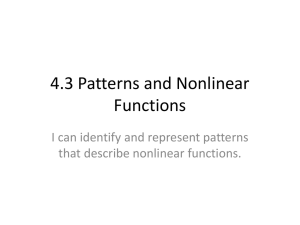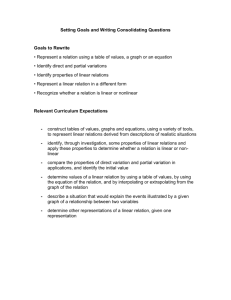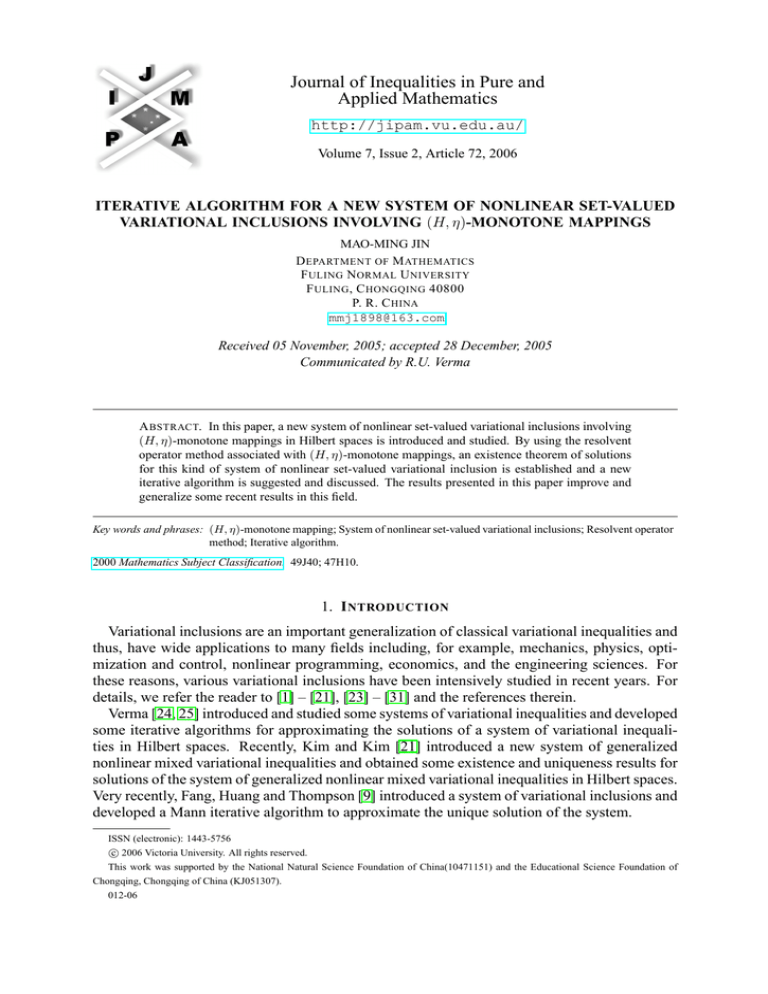
Journal of Inequalities in Pure and
Applied Mathematics
http://jipam.vu.edu.au/
Volume 7, Issue 2, Article 72, 2006
ITERATIVE ALGORITHM FOR A NEW SYSTEM OF NONLINEAR SET-VALUED
VARIATIONAL INCLUSIONS INVOLVING (H, η)-MONOTONE MAPPINGS
MAO-MING JIN
D EPARTMENT OF M ATHEMATICS
F ULING N ORMAL U NIVERSITY
F ULING , C HONGQING 40800
P. R. C HINA
mmj1898@163.com
Received 05 November, 2005; accepted 28 December, 2005
Communicated by R.U. Verma
A BSTRACT. In this paper, a new system of nonlinear set-valued variational inclusions involving
(H, η)-monotone mappings in Hilbert spaces is introduced and studied. By using the resolvent
operator method associated with (H, η)-monotone mappings, an existence theorem of solutions
for this kind of system of nonlinear set-valued variational inclusion is established and a new
iterative algorithm is suggested and discussed. The results presented in this paper improve and
generalize some recent results in this field.
Key words and phrases: (H, η)-monotone mapping; System of nonlinear set-valued variational inclusions; Resolvent operator
method; Iterative algorithm.
2000 Mathematics Subject Classification. 49J40; 47H10.
1. I NTRODUCTION
Variational inclusions are an important generalization of classical variational inequalities and
thus, have wide applications to many fields including, for example, mechanics, physics, optimization and control, nonlinear programming, economics, and the engineering sciences. For
these reasons, various variational inclusions have been intensively studied in recent years. For
details, we refer the reader to [1] – [21], [23] – [31] and the references therein.
Verma [24, 25] introduced and studied some systems of variational inequalities and developed
some iterative algorithms for approximating the solutions of a system of variational inequalities in Hilbert spaces. Recently, Kim and Kim [21] introduced a new system of generalized
nonlinear mixed variational inequalities and obtained some existence and uniqueness results for
solutions of the system of generalized nonlinear mixed variational inequalities in Hilbert spaces.
Very recently, Fang, Huang and Thompson [9] introduced a system of variational inclusions and
developed a Mann iterative algorithm to approximate the unique solution of the system.
ISSN (electronic): 1443-5756
c 2006 Victoria University. All rights reserved.
This work was supported by the National Natural Science Foundation of China(10471151) and the Educational Science Foundation of
Chongqing, Chongqing of China (KJ051307).
012-06
2
M AO -M ING J IN
On the other hand, monotonicity techniques were extended and applied in recent years because of their importance in the theory of variational inequalities, complementarity problems,
and variational inclusions. In 2003, Huang and Fang [16] introduced a class of generalized
monotone mappings, maximal η-monotone mappings, and defined an associated resolvent operator. Using resolvent operator methods, they developed some iterative algorithms to approximate the solution of a class of general variational inclusions involving maximal η-monotone
operators. Huang and Fang’s method extended the resolvent operator method associated with an
η-subdifferential operator due to Ding and Luo [6]. In [7], Fang and Huang introduced another
class of generalized monotone operators, H-monotone operators, and defined an associated resolvent operator. They also established the Lipschitz continuity of the resolvent operator and
studied a class of variational inclusions in Hilbert spaces using the resolvent operator associated
with H-monotone operators. In a recent paper [9], Fang, Huang and Thompson further introduced a new class of generalized monotone operators, (H, η)-monotone operators, which provide a unifying framework for classes of maximal monotone operators, maximal η-monotone
operators, and H-monotone operators. They also studied a system of variational inclusions
using the resolvent operator associated with (H, η)-monotone operators.
Inspired and motivated by recent research works in this field, in this paper, we shall introduce and study a new system of nonlinear set-valued variational inclusions involving (H, η)monotone mappings in Hilbert spaces. By using the resolvent operator method associated with
(H, η)-monotone mappings, an existence theorem for solutions for this type of system of nonlinear set-valued variational inclusion is established and a new iterative algorithm is suggested
and discussed. The results presented in this paper improve and generalize some recent results
in this field.
2. P RELIMINARIES
Let X be a real Hilbert space endowed with a norm k · k and an inner product h·, ·i, respectively. 2X and C(X) denote the family of all the nonempty subsets of X and the family of
all closed subsets of X, respectively. Let us recall the following definitions and some known
results.
Definition 2.1. Let T, H : X → X be two single-valued mappings. T is said to be:
(i) monotone, if
hT x − T y, x − yi ≥ 0
for all x, y ∈ X;
(ii) strictly monotone, if T is monotone and
hT x − T y, x − yi = 0
if and only if x = y;
(iii) r-strongly monotone, if there exists a constant r > 0 such that
hT (x) − T (y), x − yi ≥ rkx − yk2
for all x, y ∈ X;
(iv) s-strongly monotone with respect to H, if there exists a constant s > 0 such that
hT (x) − T (y), H(x) − H(y)i ≥ Skx − yk2
for all x, y ∈ X;
(v) t-Lipschitz continuous, if there exists a constant t > 0 such that
kT (x) − T (y)k ≤ tkx − yk
for all x, y ∈ X.
Definition 2.2. A single-valued mapping η : X × X → X is said to be:
(i) monotone, if
hx − y, η(x, y)i ≥ 0
for all x, y ∈ X;
J. Inequal. Pure and Appl. Math., 7(2) Art. 72, 2006
http://jipam.vu.edu.au/
I TERATIVE A LGORITHM
FOR
N ONLINEAR S ET-VALUED VARIATIONAL I NCLUSIONS
3
(ii) strictly monotone, if
hx − y, η(x, y)i ≥ 0
for all x, y ∈ X
and equality holds if and only if x = y;
(iii) δ-srongly monotone, if there exists a constant δ > 0 such that
hx − y, η(x, y)i ≥ δkx − yk2
for all x, y ∈ X;
(iv) τ -Lipschitz continuous, if there exists a constant τ > 0 such that
kη(x, y)k ≤ τ kx − yk,
for all x, y ∈ X.
Definition 2.3. Let η : X × X → X and H : X → X be two single-valued mappings. A
set-valued mapping M : X → 2X is said to be:
(i) monotone, if
hu − v, x − yi ≥ 0,
∀x, y ∈ X,
u ∈ M x, v ∈ M y;
(ii) η-monotone, if
hu − v, η(x, y)i ≥ 0
∀x, y ∈ X, u ∈ M x, v ∈ M y;
(iii) strictly η-monotone, if M is η-monotone and equality holds if and only if x = y;
(iv) r-strongly η-monotone, if there exists a constant r > 0 such that
hu − v, η(x, y)i ≥ rkx − yk2
∀x, y ∈ X, u ∈ M x, v ∈ M y;
(v) maximal monotone, if M is monotone and (I + λM )(X) = X, for all λ > 0, where I
denotes the identity mapping on X;
(vi) maximal η-monotone, if M is η-monotone and (I + λM )(X) = X, for all λ > 0;
(vii) H-monotone, if M is monotone and (H + λM )(X) = X, for all λ > 0;
(viii) (H, η)-monotone, if M is η-monotone and (H + λM )(X) = X, for all λ > 0.
Remark 2.1. Maximal η-monotone mappings, H-monotone mappings, and (H, η)-monotone
mappings were first introduced in Huang and Fang [16], Fang and Huang [7, 9], respectively.
Obviously, the class of (H, η)- monotone mappings provides a unifying framework for classes
of maximal monotone mappings, maximal η-monotone mappings, and H-monotone mappings.
For details about these mappings, we refer the reader to [6, 7, 9, 16] and the references therein.
Lemma 2.2 ([9]). Let η : X × X → X be a single-valued mapping, H : X → X be a strictly
η-monotone mapping and M : X → 2X an (H, η)-monotone mapping. Then the mapping
(H + λM )−1 is single-valued.
H,η
By Lemma 2.2, we can define the resolvent operator RM,λ
as follows.
Definition 2.4 ([9]). Let η : X × X → X be a single-valued mapping, H : X → X a strictly
η-monotone mapping and M : X → 2X an (H, η)-monotone mapping. The resolvent operator
H,η
RM,λ
: X → X is defined by
H,η
RM,λ
(z) = (H + λM )−1 (z)
for all z ∈ X,
where λ > 0 is a constant.
Remark 2.3.
(i) When H = I, Definition 2.4 reduces to the definition of the resolvent operator of a
maximal η-monotone mapping, see [16].
(ii) When η(x, y) = x − y for all x, y ∈ X, Definition 2.4 reduces to the definition of the
resolvent operator of a H-monotone mapping, see [7].
J. Inequal. Pure and Appl. Math., 7(2) Art. 72, 2006
http://jipam.vu.edu.au/
4
M AO -M ING J IN
(iii) When H = I and η(x, y) = x − y for all x, y ∈ X, Definition 2.4 reduces to the
definition of the resolvent operator of a maximal monotone mapping, see [31].
Lemma 2.4 ([9]). Let η : X × X → X be a τ -Lipschtiz continuous mapping, H : X → X
be an (r, η)-strongly monotone mapping and M : X → 2X be an (H, η)-monotone mapping.
H,η
Then the resolvent operator RM,λ
: X → X is τ /r-Lipschitz continuous, that is,
τ
H,η
H,η
for all x, y ∈ X.
RM,λ (x) − RM,λ (y) ≤ kx − yk
r
We define a Hausdorff pseudo-metric D : 2X × 2X → (−∞, +∞) ∪ {+∞} by
D(·, ·) = max sup inf ku − vk, sup inf ku − vk
u∈A v∈B
u∈B v∈A
for any given A, B ∈ 2X . Note that if the domain of D is restricted to closed bounded subsets,
then D is the Hausdorff metric.
Definition 2.5. A set-valued mapping A : X → 2X is said to be D-Lipschitz continuous if
there exists a constant η > 0 such that
D(A(u), A(v)) ≤ ηku − vk,
3. S YSTEM
OF
for all u, v ∈ X.
VARIATIONAL I NCLUSIONS
In this section, we shall introduce a new system of set-valued variational inclusions involving
(H, η)-monotone mappings in Hilbert spaces. In what follows, unless other specified, we shall
suppose that X1 and X2 are two real Hilbert spaces, K1 ⊂ X1 and K2 ⊂ X2 are two nonempty,
closed and convex sets. Let F : X1 × X2 → X1 , G : X1 × X2 → X2 , Hi : Xi → Xi ,
ηi : Xi × Xi → Xi (i = 1, 2) be nonlinear mappings. Let A : X1 → 2X1 and B : X2 → 2X2 be
set-valued mappings, Mi : Xi → 2Xi be (Hi , ηi )-monotone mappings (i = 1, 2). The system
of nonlinear set-valued variational inclusions is formulated as follows. Find (a, b) ∈ X1 × X2 ,
u ∈ A(a) and v ∈ B(b) such that
0 ∈ F (a, v) + M1 (a)
(3.1)
0 ∈ G(u, b) + M2 (b)
Special Cases
Case 1. If M1 (x) = ∂ϕ(x) and M2 = ∂φ(y) for all x ∈ X1 and y ∈ X2 , where ϕ : X1 → R ∪
{+∞} and φ : X2 → R∪{+∞} are two proper, convex and lower semi-continuous functionals,
∂ϕ and ∂φ denote the subdifferential operators of ϕ and φ, respectively, then problem (3.1)
reduces to the following problem: find (a, b) ∈ X1 × X2 , u ∈ A(a), and v ∈ B(v) such that
hF (a, v), x − ai + ϕ(x) − ϕ(a) ≥ 0, ∀x ∈ X1 ,
(3.2)
hG(u, b), y − ai + φ(y) − φ(b) ≥ 0, ∀y ∈ X ,
2
which is called a system of set-valued mixed variational inequalities. Some special cases of
problem (3.2) can be found in [26].
Case 2. If A and B are both identity mappings, then problem (3.2) reduces to the following
problem: find (a, b) ∈ X1 × X2 such that
hF (a, b), x − ai + ϕ(x) − ϕ(a) ≥ 0, ∀x ∈ X1 ,
(3.3)
hG(a, b), y − ai + φ(y) − φ(b) ≥ 0, ∀y ∈ X ,
2
J. Inequal. Pure and Appl. Math., 7(2) Art. 72, 2006
http://jipam.vu.edu.au/
I TERATIVE A LGORITHM
FOR
N ONLINEAR S ET-VALUED VARIATIONAL I NCLUSIONS
5
which is called system of nonlinear variational inequalities considered by Cho, Fang, Huang
and Hwang [5]. Some special cases of problem (3.3) were studied by Kim and Kim [21], and
Verma [24].
Case 3. If M1 (x) = ∂δK1 (x) and M2 (y) = ∂δK2 (y), for all x ∈ K1 and y ∈ K2 , where
K1 ⊂ X1 and K2 ⊂ X2 are two nonempty, closed, and convex subsets, and δK1 and δK2 denote
the indicator functions of K1 and K2 , respectively. Then problem (3.2) reduces to the following
system of variational inequalities: find (a, b) ∈ K1 × K2 such that
hF (a, b), x − ai ≥ 0, ∀x ∈ K1 ,
(3.4)
hG(a, b), y − ai ≥ 0, ∀y ∈ K ,
2
which is the problem in [20] with both F and G being single-valued.
Case 4. If X1 = X2 = X, K1 = K2 = K, F (X, y) = ρT (y) + x − y, and G(x, y) =
γT (x) + y − x, for all x, y ∈ X, where T : K → X is a nonlinear mapping, ρ > 0 and
γ > 0 are two constants, then problem (3.4) reduces to the following system of variational
inequalities: find (a, b) ∈ K × K such that
hρT (b) + a − b, x − ai ≥ 0, ∀x ∈ K,
(3.5)
hγT (a) + b − a, x − bi ≥ 0, ∀x ∈ K,
which is the system of nonlinear variational inequalities considered by Verma [25].
Case 5. If A and B are both identity mappings, the problem (3.1) reduces to the following
problem: (a, b) ∈ X1 × X2 such that
0 ∈ F (a, b) + M1 (a)
(3.6)
0 ∈ G(a, b) + M (b)
2
which is the system of variational inclusions considered by Fang, Huang and Thompson [9].
4. I TERATIVE A LGORITHM AND C ONVERGENCE
In this section, by using the resolvent operator method associated with (H, η)-monotone
mappings, a new iterative algorithm for solving problem (3.1) is suggested. The convergence
of the iterative sequence generated by the algorithm is proved.
Theorem 4.1. For given (a, b) ∈ X1 × X2 , u ∈ A(a), v ∈ B(b), (a, b, u, v) is a solution of
problem (3.1) if and only if (a, b, u, v) satisfies the relation
H ,η
a = RM11 ,ρ11 [H1 (a) − ρ1 F (a, v)],
(4.1)
H2 ,η2
b = RM
[H2 (b) − ρ2 G(u, b)],
2 ,ρ2
where ρi > 0 are two constants for i = 1, 2.
Proof. This directly follows from Definition 2.4.
The relation (4.1) and Nadler [22] allows us to suggest the following iterative algorithm.
Algorithm 4.1.
Step 1. Choose (a0 , b0 ) ∈ X1 × X2 and choose u0 ∈ A(a0 ) and v0 ∈ B(b0 ).
J. Inequal. Pure and Appl. Math., 7(2) Art. 72, 2006
http://jipam.vu.edu.au/
6
M AO -M ING J IN
Step 2. Let
(4.2)
H ,η
an+1 = (1 − λ)an + λRM11 ,ρ11 [H1 (an ) − ρ1 F (an , vn )],
H2 ,η2
bn+1 = (1 − λ)bn + λRM
[H2 (bn ) − ρ2 G(un , bn )],
2 ,ρ2
where 0 < λ ≤ 1 is a constant.
Step 3. Choose un+1 ∈ A(an+1 ) and vn+1 ∈ B(bn+1 ) such that
kun+1 − un k ≤ (1 + (1 + n)−1 )D1 (A(an+1 ), A(an )),
(4.3)
kv
−1
n+1 − vn k ≤ (1 + (1 + n) )D2 (B(bn+1 ), B(bn )),
where Di (·, ·) is the Hausdorff pseudo-metric on 2Xi for i = 1, 2.
Step 4. If an+1 , bn+1 , un+1 and vn+1 satisfy (4.2) to sufficient accuracy, stop; otherwise, set
n := n + 1 and return to Step 2.
Theorem 4.2. Let ηi : Xi × Xi → Xi be τi -Lipschitz continuous mappings, Hi : Xi → Xi
(ri , η)-strongly monotone and βi -Lipschitz continuous mappings, Mi : Xi → 2X
i be (Hi , ηi )monotone mappings for i = 1, 2. Let A : X1 → C(X1 ) be D1 -γ1 -Lipschitz continuous and B :
X2 → C(X2 ) be D2 -γ2 -Lipschitz continuous. Let F : X1 × X2 → X1 be a nonlinear mapping
such that for any given (a, b) ∈ X1 × X2 , F (·, b) is µ1 -strongly monotone with respect to H1
and α1 -Lipschitz continuous and F (a, ·) is ζ1 -Lipschitz continuous. Let G : X1 × X2 → X2 be
a nonlinear mapping such that for any given (x, y) ∈ X1 × X2 , G(x, ·) is µ2 -strongly monotone
with respect to H2 and α2 -Lipschitz continuous and G(·, y) is ζ2 -Lipschitz continuous. If there
exist constants ρi > 0 for i = 1, 2 such that
p
τ1 r2 β12 − 2ρ1 µ1 + ρ21 α12 + τ2 r1 ζ2 γ1 < r1 r2 ,
(4.4)
p
τ2 r1 β22 − 2ρ2 µ2 + ρ22 α22 + τ1 r2 ζ1 γ2 < r1 r2 ,
then problem (3.1) admits a solution (a, b, u, v) and iterative sequences {an }, {bn }, {un } and
{vn } converge strongly to a, b, u and v, respectively, where {an }, {bn }, {un } and {vn } are the
sequences generated by Algorithm 4.1.
Proof. It follows from (4.2) and Lemma 2.4 that
kan+1 − an k
H1 ,η1
= (1 − λ)an + λRM
(H1 (an ) − ρ1 F (an , vn ))
1 ,ρ1
h
i
H1 ,η1
(H
(a
)
−
ρ
F
(a
,
v
))
− (1 − λ)an−1 + λRM
1 n−1
1
n−1 n−1
1 ,ρ1
H1 ,η1
≤ (1 − λ)kan − an−1 k + λ RM
(H1 (an ) − ρ1 F (an , vn ))
1 ,ρ1
H1 ,η1
− RM
(H
(a
)
−
ρ
F
(a
,
v
))
1 n−1
1
n−1 n−1 1 ,ρ1
τ1
≤ (1 − λ)kan − an−1 k + λ kH1 (an ) − H1 (an−1 ) − ρ1 [F (an , vn ) − F (an−1 , vn−1 )]k
r1
τ1
≤ (1 − λ)kan − an−1 k + λ (kH1 (an ) − H1 (an−1 ) − ρ1 [F (an , vn ) − F (an−1 , vn )]k
r1
(4.5)
+ kF (an−1 , vn ) − F (an−1 , vn−1 )k).
J. Inequal. Pure and Appl. Math., 7(2) Art. 72, 2006
http://jipam.vu.edu.au/
I TERATIVE A LGORITHM
FOR
N ONLINEAR S ET-VALUED VARIATIONAL I NCLUSIONS
7
Similarly, we can prove that
(4.6) kbn+1 − bn k ≤ (1 − λ)kbn − bn−1 k
τ2
+ λ (kH2 (bn ) − H2 (bn−1 ) − ρ2 [G(un , bn ) − G(un , bn−1 )]k
r2
+ kG(un , bn−1 ) − G(un−1 , bn−1 )k).
Since Hi are βi -Lipschitz continuous for i = 1, 2, F (·, b) is µ1 -strongly monotone with respect
to H1 and α1 -Lipschitz continuous, G(x, ·) is µ2 -strongly monotone with respect to H2 and
α2 -Lipschitz continuous, we obtain
kH1 (an ) − H1 (an−1 ) − ρ1 [F (an , vn ) − F (an−1 , vn )]k2
= kH1 (an ) − H1 (an−1 )k2 − 2ρ1 hF (an , vn ) − F (an−1 , vn ), H1 (an ) − H1 (an−1 )i
+ ρ21 kF (an , vn ) − F (an−1 , vn )k2
(4.7)
≤ (β12 − 2ρ1 µ1 + ρ21 α12 )kan − an−1 k2
and
kH2 (bn ) − H2 (bn−1 ) − ρ2 [G(un , bn ) − G(un , bn−1 )]k2
= kH2 (bn ) − H2 (bn−1 )k2 − 2ρ2 hG(un , bn ) − G(un , bn−1 ), H2 (bn ) − H2 (bn−1 )i
+ ρ22 kG(un , bn ) − G(un , bn−1 )k2
(4.8)
≤ (β22 − 2ρ2 µ2 + ρ22 α22 )kbn − bn−1 k2 .
Further, from the assumptions, we have
(4.9)
kF (an−1 , vn ) − F (an−1 , vn−1 )k ≤ ζ1 kvn − vn−1 k
≤ ζ1 γ2 (1 + n−1 )kbn − bn−1 k,
(4.10)
kG(un , bn−1 ) − G(un−1 , bn−1 )k ≤ ζ2 kun − un−1 k
≤ ζ2 γ1 (1 + n−1 )kan − an−1 k.
It follows from (4.5) – (4.10) that
p
τ1
2
2 2
kan+1 − an k ≤ 1 − λ + λ r1 β1 − 2ρ1 µ1 + ρ1 α1 kan − an−1 k
+λ rτ11 ζ1 γ2 (1 + n−1 )kbn − bn−1 k,
(4.11)
p
τ2
2
2 2
β
−
2ρ
µ
+
ρ
α
kb
−
b
k
≤
1
−
λ
+
λ
2 2
n+1
n
2
2 2 kbn − bn−1 k
r2
τ2
+λ r2 ζ2 γ1 (1 + n−1 )kan − an−1 k.
Now (4.11) implies that
(4.12)
kan+1 − an k + kbn+1 − bn k
q
τ1
τ2
−1
2
2 2
≤ 1−λ+λ
β1 − 2ρ1 µ1 + ρ1 α1 + λ ζ2 γ1 (1 + n ) kan − an−1 k
r1
r2
q
τ2
τ1
−1
2
2 2
+ 1−λ+λ
β2 − 2ρ2 µ2 + ρ2 α2 + λ ζ1 γ2 (1 + n ) kbn − bn−1 k
r2
r1
≤ (1 − λ + λθn )(kan − an−1 k + kbn − bn−1 k),
J. Inequal. Pure and Appl. Math., 7(2) Art. 72, 2006
http://jipam.vu.edu.au/
8
M AO -M ING J IN
where
θn = max
τ1
r1
q
τ2
β12 − 2ρ1 µ1 + ρ21 α12 + ζ2 γ1 (1 + n−1 ) ,
r2
q
τ2
τ1
−1
2
2 2
β2 − 2ρ2 µ2 + ρ2 α2 + ζ1 γ2 (1 + n ) .
r2
r1
q
q
τ2
τ2
τ1
2
2 2
2
2 2
β1 − 2ρ1 µ1 + ρ1 α1 + ζ2 γ1 ,
β2 − 2ρ2 µ2 + ρ2 α2 + ζ1 γ2 ,
r2
r2
r1
Letting
θ = max
τ1
r1
we have that θn → θ as n → ∞. It follows from condition (4.4) that 0 < θ < 1. Therefore, by
(4.12) and 0 < λ ≤ 1, {an } and {bn } are both Cauchy sequences and so there exist a ∈ X1 and
b ∈ X2 such that an → a and bn → b as n → ∞.
Now we prove that un → u ∈ A(u) and vn → v ∈ B(b) as n → ∞. In fact, it follows from
(4.9) and (4.10) that {un } and {vn } are also Cauchy sequences. Therefore, there exist u ∈ X1
and v ∈ X2 such that un → u and vn → v as n → ∞. Further,
d(u, A(u)) = inf{ku − tk : t ∈ A(a)}
≤ ku − un k + d(un , A(a))
≤ ku − un k + D1 (A(an ), A(a))
≤ ku − un k + ζ1 kan − ak → 0.
Hence, since A(a) is closed, we have u ∈ A(a). Similarly, we can prove that v ∈ B(b).
By continuity, a, b, u and v satisfy the following relation
H ,η
a = RM11 ,ρ11 [H1 (a) − ρ1 F (a, v)],
H2 ,η2
b = RM
[H2 (b) − ρ2 G(u, b)].
2 ,ρ2
By Theorem 4.1, we know that (a, b, u, v) is a solution of problem (3.1). This completes the
proof.
R EFERENCES
[1] S. ADLY, Perturbed algorithm and sensitivity analysis for a general class of variational inclusions,
J. Math. Anal. Appl., 201 (1996), 609–630.
[2] R.P. AGARWAL, N.J. HUANG AND Y.J. CHO, Generalized nonlinear mixed implicit quasivariational inclusions with set-valued mappings, J. Inequal. Appl., 7(6) (2002), 807–828.
[3] R. AHMAD AND Q.H. ANSARI, An iterative algorithm for generalized nonlinear variational inclusions, Appl. Math. Lett., 13(5) (2002), 23–26.
[4] S.S. CHANG, Y.J. CHO AND H.Y. ZHOU, Iterative Methods for Nonlinear Operator Equations in
Banach Spaces, Nova Sci. Publ., New York, (2002).
[5] Y.J. CHO, Y.P. FANG, N.J. HUANG AND H.J. HWANG, Algorithms for systems of nonlinear
variational inequalities, J. Korean Math Soc., 41 (2004), 489–499.
[6] X.P. DING AND C.L. LUO, Perturbed proximal point algorithms for generalized quasi-variationallike inclusions, J. Comput. Appl. Math., 210 (2000), 153–165.
[7] Y.P. FANG AND N.J. HUANG, H-Monotone operator and resolvent operator technique for variational inclusions, Appl. Math. Comput., 145 (2003), 795–803.
J. Inequal. Pure and Appl. Math., 7(2) Art. 72, 2006
http://jipam.vu.edu.au/
I TERATIVE A LGORITHM
FOR
N ONLINEAR S ET-VALUED VARIATIONAL I NCLUSIONS
9
[8] Y.P. FANG AND N.J. HUANG, H-monotone operators and system of variational inclusions, Communications on Applied Nonlinear Analysis, 11(1) (2004), 93–101.
[9] Y.P. FANG, N.J. HUANG AND THOMPSON, A new system of variational inclusions with (H, η)monotone operators in Hilbert spaces, Computers. Math. Applic., 49 (2005), 365–374.
[10] F. GIANNESSI AND A. MAUGERI, Variational Inequalities and Network Equilibrium Problems,
New York (1995).
[11] A. HASSOUNI AND A. MOUDAFI, A perturbed algorithms for variational inequalities, J. Math.
Anal. Appl., 185 (1994), 706–712.
[12] N.J. HUANG, Generalized nonlinear variational inclusions with noncompact valued mapping,
Appl. Math. Lett., 9(3) (1996), 25–29.
[13] N.J. HUANG, Nonlinear Implicit quasi-variational inclusions involving generalized m-accretive
mappings, Arch. Inequal. Appl., 2 (2004), 403–416.
[14] N.J. HUANG, Mann and Ishikawa type perturbed iterative algorithms for generalized nonlinear
implicit quasi-variational inclusions, Computers Math. Applic., 35(10) (1998), 1–7.
[15] N.J. HUANG, A new completely general class of variational inclusions with noncompact valued
mappings, Computers Math. Applic., 35(10) (1998), 9–14.
[16] N.J. HUANG AND Y.P. FANG, A new class of general variational inclusions involving maximal
η-monotone mappings, Publ Math. Debrecen, 62 (2003), 83–98.
[17] M.M. JIN, A new proximal point algorithm with errors for nonlinear variational inclusions involving generalized m-accretive mappings, Nonlinear Anal. Forum, 9(1) (2004), 87–96.
[18] M.M. JIN AND Q.K. LIU, Nonlinear quasi-variational inclusions involving generalized m-accretive
mappings, Nonlinear Funct. Anal. Appl., 9(3) (2004), 485–494.
[19] M.M. JIN, Generalized nonlinear implicit quasi-variational inclusions with relaxed monotone mappings, Adv. Nonlinear Var. Inequal., 7(2) (2004), 173–181.
[20] G. KASSAY AND J. KOLUMBAN, System of multi-valued variational inequalities, Publ. Math.
Debrecen, 56 (2000), 185–195.
[21] J.K. KIM AND D.S. KIM, A new system of generalized nonlinear mixed variational inequalities in
Hilbert spaces, J. Convex Anal., 11 (2004), 117–124.
[22] S.B. NADLER, Muliti-valued contraction mappings, Pacific J. Math., 30 (1969), 475–488.
[23] K.R. KAZMI, Mann and Ishikawa type perturbed iterative algorithms for generalized quasivariational inclusions, J. Math. Anal. Appl., 209 (1997), 572–584.
[24] R.U. VERMA, Iterative algorithms and a new system of nonlinear quasivariational inequalities,
Adv. Nonlinear Var. Inequal., 4(1) (2001), 117–124.
[25] R.U. VERMA, Projection methods, Algorithms, and a new system of nonlinear quasivariational
inequalities, Comput. Math. Appl., 41 (2001), 1025–1031.
[26] R.U. VERMA, Generalized system for relaxed coercive variational inequalities and projection
methods, J. Optim. Theory Appl., 121 (2004), 203–210.
[27] R.U. VERMA, Generalized variational inequalities involving multivalued relaxed monotone operators, Appl. Math. Lett., 10(4) (1997), 107–109.
[28] R.U. VERMA, A-monotonicity and applications to nonlinear variational inclusions, Journal of
Applied Mathematics and Stochastic Analysis, 17(2) (2004), 193–195.
[29] R.U. VERMA, Approximation-solvability of a class of A-monotone variational inclusion problems,
J. KSIAM, 8(1) (2004), 55–66.
J. Inequal. Pure and Appl. Math., 7(2) Art. 72, 2006
http://jipam.vu.edu.au/
10
M AO -M ING J IN
[30] GEORGE X.Z. YUAN, KKM Theory and Applications in Nonlinear Analysis, Marcel Dekker, New
York, 1999.
[31] D.L. ZHU AND P. MARCOTTE, Co-coercivity and its roll in the convergence of iterative schemes
for solving variational inequalities, SIAM J. Optimization, 6 (1996), 714–726.
J. Inequal. Pure and Appl. Math., 7(2) Art. 72, 2006
http://jipam.vu.edu.au/


